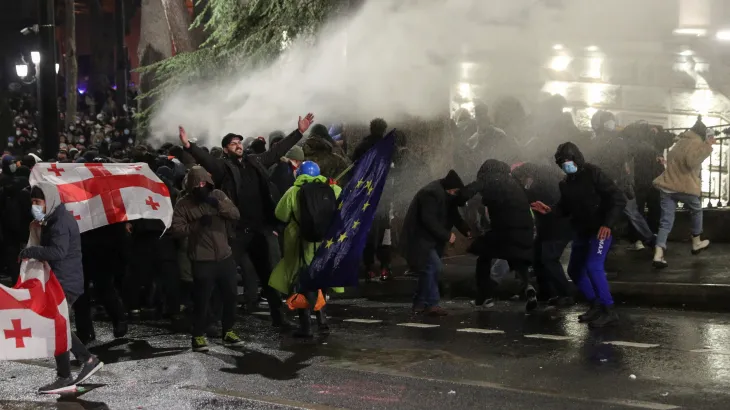Georgian authorities detained 107 people in Tbilisi during overnight protests against the government’s decision to freeze European Union accession talks, the interior ministry reported Saturday, as demonstrations entered their third day.

Police deployed water cannons, tear gas, and pepper spray against thousands of pro-European protesters who erected barricades outside parliament and hurled fireworks at officers. The demonstrations erupted after the ruling Georgian Dream party announced Thursday it would halt EU membership negotiations until 2028, violating the country’s constitutional commitment to European integration.
“We’ll be here every night until they get tired,” said Nika Gvaramia, leader of the opposition Coalition for Change, warming his hands over a street fire. “This is our country, we only have one, we’re going to fight for Europe.”
The decision has sparked widespread institutional rebellion, with hundreds of employees from key government ministries, including foreign affairs, defence, education, and justice, signing open letters condemning the freeze as unconstitutional. Private universities have suspended classes, while business groups are demanding the government reverse its position.

Georgian Dream, which secured 54% in a contested October election, claims it was responding to EU “blackmail.” The move follows deteriorating relations with Western nations, which have accused the Tbilisi government of authoritarian and pro-Russian tendencies. The party has recently passed controversial “foreign agents” and LGBT rights laws that critics say mirror Russian legislation.
Opposition leader Elene Khoshtaria, wearing a sling from injuries sustained in Thursday’s protests, called for international intervention. “We are not going to give in, we are not going to give up,” she said. “But I think the international community should think how to support people who really believe in European values.”
The EU’s ambassador to Georgia described the ruling party’s stance as “heartbreaking” and condemned the crackdown on protesters. Georgian Dream, controlled largely by billionaire former Prime Minister Bidzina Ivanishvili, maintains it ultimately seeks EU membership but argues its recent laws are necessary to protect Georgian values.
EU membership consistently receives overwhelming public support in Georgia according to opinion polls.
REUTERS



